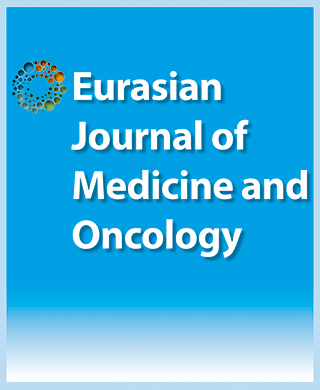

99mTc-MIBI Brain SPECT Before and After Radiotherapy to Assess Survival Predictability in Glioblastoma Multiforme Patients
Huseyin Tepetam1, Ozlem Turkoglu2, Dehan Yazıcı31Department of Radiation Oncology, Kartal Dr Lütfi Kirdar Training and Research Hospital, Istanbul, Turkey, 2Department of Radiology, Kartal Dr Lütfi Kirdar Training and Research Hospital, Istanbul, Turkey, 3Department of Nuclear Medicine, Kartal Dr Lütfi Kirdar Training and Research Hospital, Istanbul, Turkey,
Objectives: The aim of this study was to evaluate the effectiveness of technetium-99m-methoxyisobutylisonitrile (99mTc-MIBI) brain single-photon emission computed tomography (SPECT) in predicting survival in glioblastoma multiforme (GBM) patients in comparison with magnetic resonance imaging (MRI) before and after radiotherapy (RT) treatment. Methods: A total of 25 patients with GBM were examined prospectively. The patients were evaluated according to survival, age, sex, Eastern Cooperative Oncology Group (ECOG) score, type of surgery, and tumor localization. All patients received RT. Brain MRI and 99mTc-MIBI brain SPECT were performed in all postoperative patients before RT. After RT, regular MRI was performed on all patients, while 99mTc-MIBI brain SPECT was performed on 14 patients. Tumor masses were incubated and Ki-67 proliferative index was measured. All of the patients were treated with corticosteroids. In event of recurrence, patients were treated with chemotherapy. Results: Patient age, duration of preoperative symptoms, ECOG score, and applicability of chemotherapy after RT were statistically significant effective indicators for survival (p<0.001). Before RT, mean survival time measured for 4 patients without 99mTc-MIBI uptake was 17.7 months, while it was 9.58 months for 6 MRI patients. Ki-67 proliferative index was associated with survival, but there was no statistically significant correlation with 99mTc-MIBI brain uptake rate. Conclusion: 99mTc-MIBI SPECT has a better correlation with survival than MRI. These results suggest 99mTc-MIBI brain SPECT can be used as a functional imaging method for future clinical studies.
Cite This Article
Tepetam H, Turkoglu O, Yazıcı D. 99mTc-MIBI Brain SPECT Before and After Radiotherapy to Assess Survival Predictability in Glioblastoma Multiforme Patients. EJMO. 2017; 1(1): 8-13
Corresponding Author: Ozlem Turkoglu



